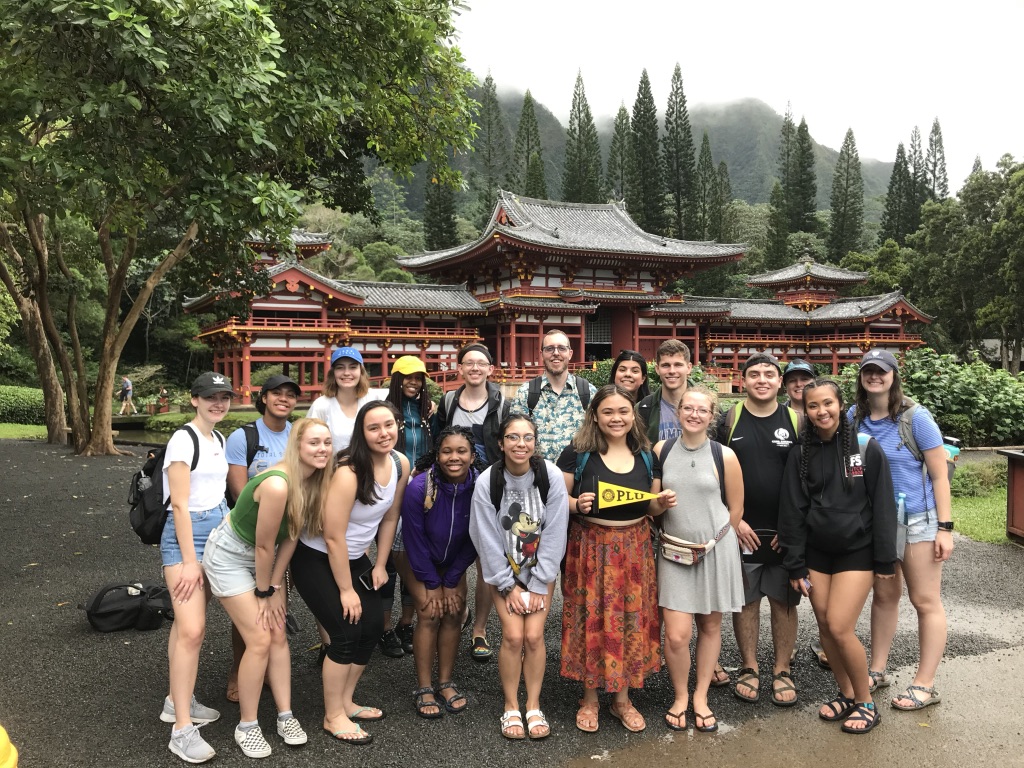Page 103 • (1,313 results in 0.284 seconds)
-

Buddhism specifically.” Sørensen further shared how all the religions “mingle and intertwine within different cultures and different countries… in a way making their own melting pot.” Stepping into the muddy, complicated history of Hawaiʻi can be off-putting at first, but it is the only way to gain the incredible experience that respecting and learning about another culture can bring. As Dr. Hammerstrom says, this course is about making “choices that support local people and the land.”After the arrival
-
biotechnological significance. As part of our microbiology course, PLU students and I examine microbial communities in various soils collected from the Pacific Northwest. Because only 1% or less of Earth’s bacteria has been successfully cultured in the laboratory, we compare culture-dependent and culture-independent techniques, including many molecular tools, to assess the diversity of various environmental niches. Mike Behrens My research interests include ecology and biogeography, primarily in aquatic
-
and world language courses with these emphases will also meet this requirement. (on Gen Ed website 04.26.23) Students will compare and contrast diverse global and transnational perspectives. Students will analyze how culture shapes experience Students will examine the historical and structural basis for inequalities related to race, ethnicity, language, religion, class, ability, nationality, sexuality, or gender. Culminating Experience (SR)Culminating Experience (1-4): Students will participate in
-
United States and, to add complexity to an already green and overwhelmed boy, I was transitioning in the aftermath of Sept. 11. That moment effectively served as my principle moment of ¨culture shock¨ during my study away experience at PLU. London led me to Valencia, Spain, following graduation, which led me to a job with the American Red Cross and a volunteer position with the World Affairs Council of Seattle. These experiences eventually guided me to India as a consultant on corporate social
-

Indigenous Studies programs. The Sámi people are one of a handful of indigenous groups of Europe living in Sápmi — northern Scandinavia and Western Russia — and the Centre for Sámi Studies works specifically to promote the study and preservation of their language and culture. “There is not a more ideal location and university in which to familiarize myself with the discipline of Indigenous Studies and utilize my multidisciplinary undergraduate degree whilst having the singular opportunity to continue
-
colleague described Emily’s teaching as transcending conventional boundaries. They wrote that “her courses destabilize fixed notions of identity and prompt students to critically examine history and culture. The transformative impact of her teaching is palpable, as students emerge empowered and equipped with a critical perspective that challenges oppressive dynamics and amplifies marginalized voices.” Emily’s dedication to fostering a supportive community is evident in the words of her students. One
-
. But as the Association for College and University Educators notes in Creating a Culture of Caring, “We must not lose sight of faculty member’s primary responsibility to students: effective teaching that leads to meaningful learning. Faculty are experts in their disciplines and, for most, mental health is not their field. Although faculty cannot (and should not) be expected to replace the role of mental health professionals, they can take actions as helpers, not clinicians, to support struggling
-
Perspective on Faulty Thinking” This talk will address a brief history of doping in sport, organizations’ responses of drug testing as a deterrent to doping use by athletes, as well as the debate of testing versus technology’s ability to identify the guilty. Additionally, this talk will address athletes’ reasoning about doping in sport and how our current competitive culture impacts how we teach, model, and coach today relative to doping. Jennifer Beller, Department of Educational Leadership and
-
Perspective on Faulty Thinking” This talk will address a brief history of doping in sport, organizations’ responses of drug testing as a deterrent to doping use by athletes, as well as the debate of testing versus technology’s ability to identify the guilty. Additionally, this talk will address athletes’ reasoning about doping in sport and how our current competitive culture impacts how we teach, model, and coach today relative to doping. Jennifer Beller, Department of Educational Leadership and
-
traditional carols heard in Conrad Susa’s A Christmas Garland medley; Ding Dong! Merrily on High, arranged by Mack Wilberg; Angels We Have Heard On High, arranged by Gabriel Dumitrescu; and the Swedish favorite, Wonderful Peace, by Gustav Nordqvist. Important historical composers Sergei Rachmaninoff and Herbert Howells are represented, as is popular British composer John Rutter. The album features beautiful new works by PLU choral faculty member Brian Galante (Ave Maria and In The Bleak Midwinter), a
Do you have any feedback for us? If so, feel free to use our Feedback Form.


